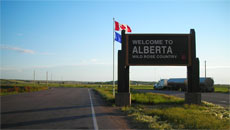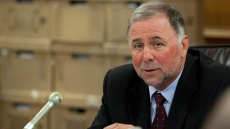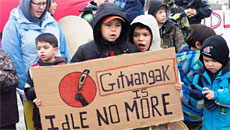Canada has violated the charter rights of nearly a million Canadians by agreeing to share their financial details with authorities in the United States, two Ontario women allege in a new lawsuit.
Gwen Deegan of Toronto and Ginny Hillis of Windsor, Ont., have launched a claim against the Attorney General of Canada.
In it, they accuse Ottawa of breaching the Constitution by complying with a sweeping new American tax fraud law, known as the Foreign Account Tax Compliance Act.
Under the terms of the legislation that took effect last month, banks must share all personal and joint account details of anyone deemed to be a "U.S. person." This includes American citizens and people born in the U.S., even those with no existing ties to the country.
The U.S. claims that more than 77,000 financial institutions around the world have agreed to co-operate with the law.
In Canada, financial institutions must share relevant account holder details, including personal details and financial balances, with the Canada Revenue Agency. The CRA will in turn pass that information along to the U.S. Internal Revenue Service.
Hillis and Deegan, both of whom were born in the U.S. but have lived in Canada since the age of five, claim Canada is exposing them and others in similar circumstances to unfair tax penalties and privacy violations by complying with the U.S. government's demands.
"I don't believe that my rights as a Canadian citizen should be abrogated by my government," Hillis said in an interview from Windsor. "I don't believe my government should be breaching our sovereignty rights as a nation ... We are a sovereign nation, we are not the 51st state of the United States."
Hillis, a retired lawyer who holds Canadian citizenship, said those who resist the new regulations could be branded as official tax cheats by the U.S. government.
Failure to comply with the laws, she said, could result in stiff financial penalties or even jail time.
A large number of Canadians are impacted by the law, she said, since FATCA's definition of a "U.S. person" is extremely broad and applies even to those who do not hold an American passport and have never worked in the country.
But Hillis also fears for Canadians who hold joint accounts with people targeted by FATCA.
Joint account details are also fair game for the IRS, she said, adding that people like her husband may be at risk of having personal information shared across the border.
David Gruber, a lawyer with Farris, Vaughan, Wills & Murphy LLP who is helping to lead the case, agrees that FATCA has broader implications.
"It's the account information itself that would be relayed by CRA to the IRS, so indirectly all parties are facing the same issue," he said. "The non-U.S. person would presumably not have any potential liability to the U.S., but nevertheless, they would have the intrusion of their privacy."
Gruber said the lawsuit is arguing that the federal government has breached the Charter of Rights and Freedoms in three ways — by violating affected people's right to liberty and security, by failing to protect them from unreasonable search and seizure, and by discriminating against them on the grounds of their country of birth.
"There's a distinction drawn in the law between Canadian citizens who fall within this definition of a U.S. person and other Canadian citizens, in that the first class of people have this intrusion into their privacy ... and the other class will not," he said. "That differential treatment of Canadian citizens, we say, is discriminatory."
It's this last point that rankles with Hillis, who feels let down by the country she calls home.
"I'm shocked at the United States, but I'm heartbroken that Canada considers me a second-class citizen."
Canada's financial industry has a powerful incentive to co-operate with FATCA regulations.
Under the law, foreign banks that don't agree to share information with the IRS face steep penalties when doing business in the U.S. The law requires American banks to withhold 30 per cent of certain payments to foreign banks that don't participate in the program — a significant price for access to the world's largest economy.
The Justice Department could not be reached for comment on the suit.





